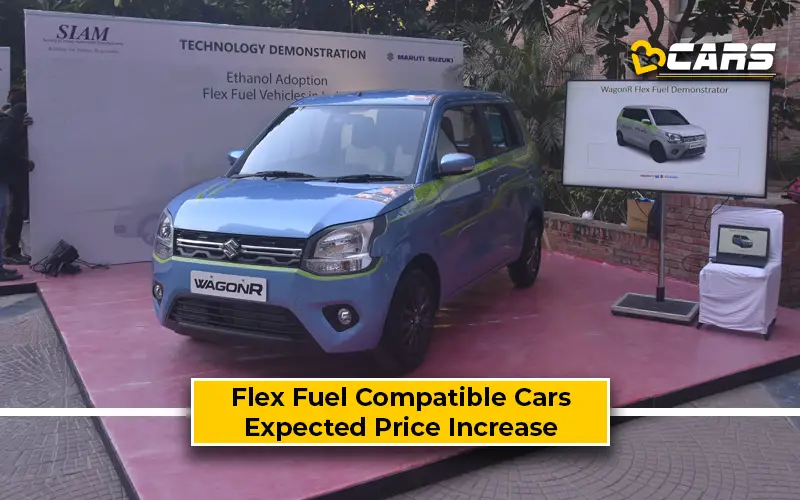Expected Price Hike For Flex Fuel Vehicles (E20, E100 Ethanol Blend) | V3Cars
In this article, we’ll explain the price increase you can expect for flex fuel cars with E20 and E100 ethanol blend compatibility. These estimations are based on the June 2021 recommendation report by NITI Aayog.

According to the report, to achieve full E100 ethanol compatibility, the production costs of a petrol car will go up by about Rs. 17,000 to Rs. Rs. 25,000. To make a petrol car compatible with E20 flex fuel or 20% ethanol blend, it’ll cost the carmakers Rs. 3,000 to Rs. 5,000 more in the production.
Please note that these are the estimated production costs in making a petrol car compatible with E20 or E100 flex fuel. The research and development costs will further add at least Rs. 1,000 to Rs. 2,000 to these estimates per vehicle. Thus, an E20 flex fuel car could cost Rs. 4,000 to Rs. 6,000 more than a normal petrol car. Meanwhile, an E100 car could cost as much as Rs. 19,000 to Rs. 27,000 more than a petrol car.
Note: Check your Car EMI with our - Car Loan EMI Calculator
The benefits of running on flex fuel don’t come from the higher fuel efficiency itself. In fact, running on full ethanol or ethanol blend poorly affects the typical mileage figures. However, the source of the raw material for the production of ethanol can greatly reduce the cost of the fuel. Therefore, even with a lower mileage, a flex fuel car could, in theory, cost less to run than a petrol car. On the other hand, according to the same report, in some cases, the then cost of ethanol was higher than that of petrol at the pump. However, it’s possible to contain this cost with large-scale production to achieve economies of scale.
Also Read: Flex Fuel Cars You Can Expect To See At Auto Expo 2023
Maruti Suzuki To Make Entire Range E20 Flex Fuel Complaint By March 2023
The advantages of using flex fuel are:
- likely to cost less than petrol
- helps reduce dependence on crude oil & provides cushion against oil, currency fluctuations
- helps contain foreign cash outflow
- produces less greenhouse gas during combustion
- uses waste materials for production
- creates a new bio-fuel production sector & employment opportunities
- relatively easier to adopt by modifying existing petrol engines
- uses existing storage, transportation & distribution infrastructure
The disadvantages of a flex fuel vehicle are:
- not suitable for current petrol engines
- ethanol is more hygroscopic than petrol
- doesn’t drastically lower ownership costs
To know more about the pros and cons of flex fuel vehicles, you can visit the following link:
Pros And Cons Of Flex Fuel Vehicles (Ethanol Blend)
Note: Check your car’s fuel cost with Fuel Cost Calculator in India



0 Comments
Maruti Suzuki Cars in India
Wagon R
₹5.55 - ₹7.21 lakh*
*Ex-showroom priceCelerio
₹5.37 - ₹7.05 lakh*
*Ex-showroom priceEeco
₹5.32 - ₹6.79 lakh*
*Ex-showroom priceDzire
₹6.79 - ₹10.14 lakh*
*Ex-showroom priceSwift
₹6.49 - ₹9.64 lakh*
*Ex-showroom priceAlto K10
₹3.99 - ₹5.96 lakh*
*Ex-showroom priceS-Presso
₹4.27 - ₹6.12 lakh*
*Ex-showroom priceBrezza
₹8.34 - ₹13.98 lakh*
*Ex-showroom priceErtiga
₹8.69 - ₹13.03 lakh*
*Ex-showroom priceWagon R
₹5.55 - ₹7.21 lakh*
*Ex-showroom priceCelerio
₹5.37 - ₹7.05 lakh*
*Ex-showroom priceEeco
₹5.32 - ₹6.79 lakh*
*Ex-showroom priceDzire
₹6.79 - ₹10.14 lakh*
*Ex-showroom priceSwift
₹6.49 - ₹9.64 lakh*
*Ex-showroom priceAlto K10
₹3.99 - ₹5.96 lakh*
*Ex-showroom priceUpcoming Maruti Suzuki Cars
Swift Hybrid
₹10.00 - ₹13.00 lakh*
*Expected PriceExpected Launch Jun 2027
WagonR EV
₹10.00 - ₹13.00 lakh*
*Expected PriceExpected Launch Oct 2027
Alto-Sized EV
₹10.00 - ₹14.00 lakh*
*Expected PriceExpected Launch Sep 2028
Brezza Matte
₹8.00 - ₹14.00 lakh*
*Expected PriceExpected Launch Oct 2025
XL5
₹8.00 - ₹12.00 lakh*
*Expected PriceExpected Launch Jun 2026
Hustler EV
₹7.00 - ₹10.00 lakh*
*Expected PriceExpected Launch Jun 2026
WagonR Flex
₹7.00 - ₹10.00 lakh*
*Expected PriceExpected Launch Jan 2027
Solio
₹5.50 - ₹7.50 lakh*
*Expected PriceExpected Launch May 2027
Swift Hybrid
₹10.00 - ₹13.00 lakh*
*Expected PriceExpected Launch Jun 2027
WagonR EV
₹10.00 - ₹13.00 lakh*
*Expected PriceExpected Launch Oct 2027
Alto-Sized EV
₹10.00 - ₹14.00 lakh*
*Expected PriceExpected Launch Sep 2028
Brezza Matte
₹8.00 - ₹14.00 lakh*
*Expected PriceExpected Launch Oct 2025
XL5
₹8.00 - ₹12.00 lakh*
*Expected PriceExpected Launch Jun 2026
Hustler EV
₹7.00 - ₹10.00 lakh*
*Expected PriceExpected Launch Jun 2026
Latest Maruti Suzuki Cars Videos
2023 Maruti Suzuki Invicto Walkaround | Differences Over Innova Hycross
Maruti Suzuki Fronx | Auto Expo 2023 | Exterior, Interior, Engine & Dimensions
Maruti Suzuki Jimny | Auto Expo 2023 | Exterior, Interior, Engine & Dimensions
Maruti Suzuki e Vitara Walkaround Review | Exterior, Interior & Specifications | Auto Expo 2025
MG Astor Select vs Maruti Suzuki Brezza ZXI+ | Which Car Is More Value For Money?
Delhi-Jaipur-Delhi in less than ₹500/person! | Long Drive in Maruti Suzuki Invicto Hybrid
Mahindra XUV 3XO AX7 vs Maruti Suzuki Brezza ZXI+ | Which Is More Value For Money Under Rs 13 Lakh?
MG Astor Sprint vs Maruti Suzuki Grand Vitara Sigma | Which Car Is More Value For Money? | Mar 2024
Maruti Suzuki Invicto Alpha+ vs Toyota Hycross Hybrid ZX | Which One To Buy?
Maruti Suzuki Invicto Petrol Hybrid Variants Explained | Zeta+ Alpha+ | Jul 2023 | V3Cars
2023 Maruti Suzuki Invicto Walkaround | Differences Over Innova Hycross
Maruti Suzuki Fronx | Auto Expo 2023 | Exterior, Interior, Engine & Dimensions
Maruti Suzuki Jimny | Auto Expo 2023 | Exterior, Interior, Engine & Dimensions
Maruti Suzuki e Vitara Walkaround Review | Exterior, Interior & Specifications | Auto Expo 2025
MG Astor Select vs Maruti Suzuki Brezza ZXI+ | Which Car Is More Value For Money?
Delhi-Jaipur-Delhi in less than ₹500/person! | Long Drive in Maruti Suzuki Invicto Hybrid
Wagon R Important Links